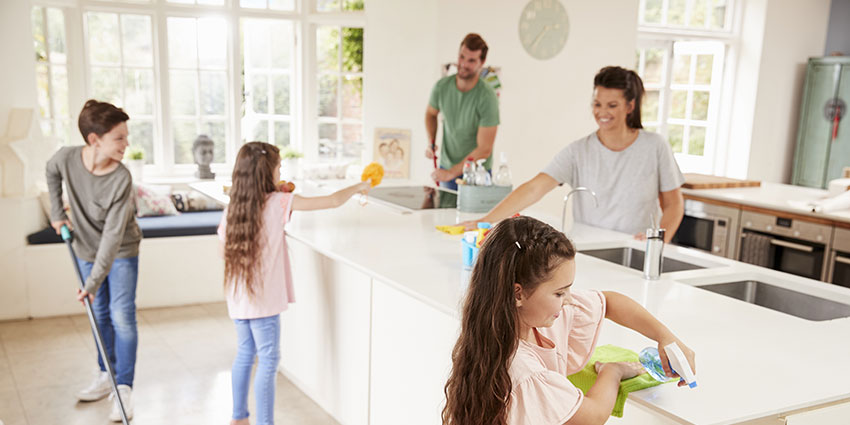Ten Tips for Keeping Your Home Germ-Free

During cold and flu season, it is particularly important to make sure your home is germ-free. Not only will your home be cleaner and smell nicer, these 10 tricks will keep you in work or school and out of the doctor's office:
- Routine Cleaning: Instead of trying to clean your whole house at once, clean routinely. Cleaning a little every day is the easiest way to keep your home germ-free. Instead of reacting to dust, mold, and other germs, you can proactively prevent bacteria from building up in the first place.
- Utilize Fans: High moisture areas are often the biggest breeding grounds for germs, bacteria, and mold. Using fans in these areas can help to prevent the accumulation and spread of bacteria and mold by eliminating the excess humidity and moisture. If you already have fans in these areas, check the ventilation routinely to ensure it is working properly.
- Wash Your Bedding: Wash all of your sheets, towels, and other bedding materials regularly in hot water. Dust mites accumulate rapidly in these items, and you tend to be in contact with them frequently.
- Clean Curtains and Ceiling Fans: It is very important to vacuum and wash your curtains and drapes and dust off your ceiling fans. These areas can trap a lot of germs and dust that are not easy to see.
- Put Down the Toilet Seat: Toilets are some of the most germ-infected places in your home. Clean toilets at least once a week. Try to put down the lid of your toilet seat prior to flushing, to prevent bacteria and germ-infected water from landing on other surfaces in your bathroom, where it can survive for a couple of hours.
- Shake Your Shower Curtain: Shaking out your shower curtain after showering can prevent moisture from building up in your bathroom by causing excess water to evaporate.
- Separate Cutting Boards: Raw meats may contain dangerous bacteria such as Salmonella. Although bacteria are eliminated when the meat is cooked, they can still survive on the cutting board. It is important to use a separate cutting board for raw meats. Cutting boards should also be thoroughly cleaned after each use, since bacteria and germs can survive even in the small cracks of the cutting board. If your cutting board has a lot of deep cracks, think about getting a new one.
- Store Your Toothbrush: Leaving your toothbrush out in an open dish on your bathroom counter can cause it to become infected with germs. Toothbrushes should be stored in separate containers and put away in drawers.
- Disinfect Your Sponge: Sponges are filled with germs and bacteria, and a simple rinsing will not eliminate them completely. Instead, put your sponge in the microwave for 1-2 minutes or run it through the dishwasher. Routinely check your dishwasher to make sure it is running at a high enough temperature to kill bacteria.
- Change Your Filters: Change your vacuum, furnace, and air conditioner filters frequently, so that you are cleaning and purifying the air and carpets, rather than adding more germs and dust.
This information is provided for your convenience and is not intended as insurance advice. The views, opinions, and advice expressed in this article do not represent those of Homesite Group Incorporated. Please consult your insurance carrier or agent for information regarding your policy or coverages.
